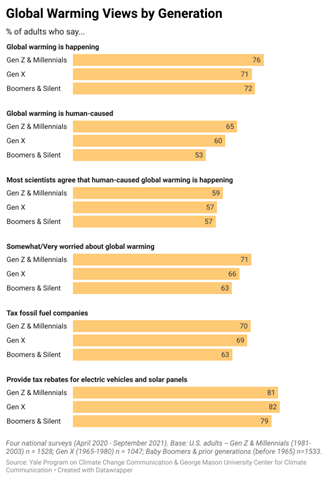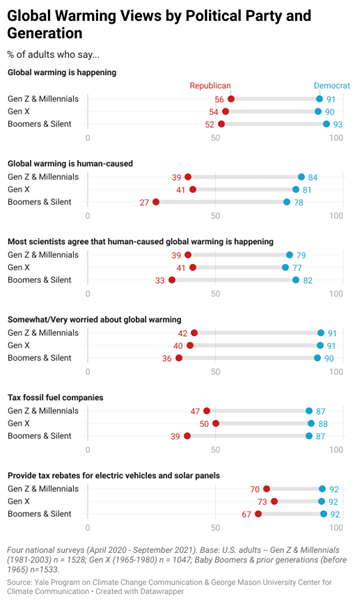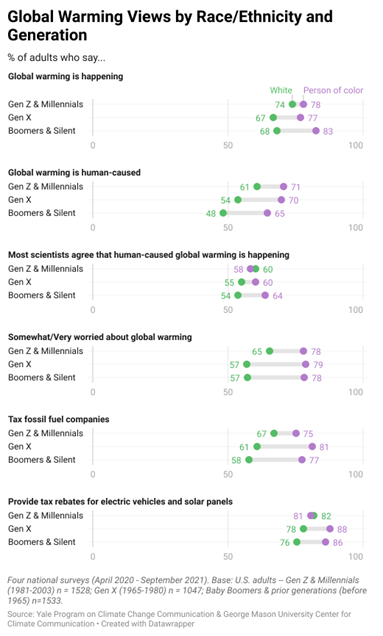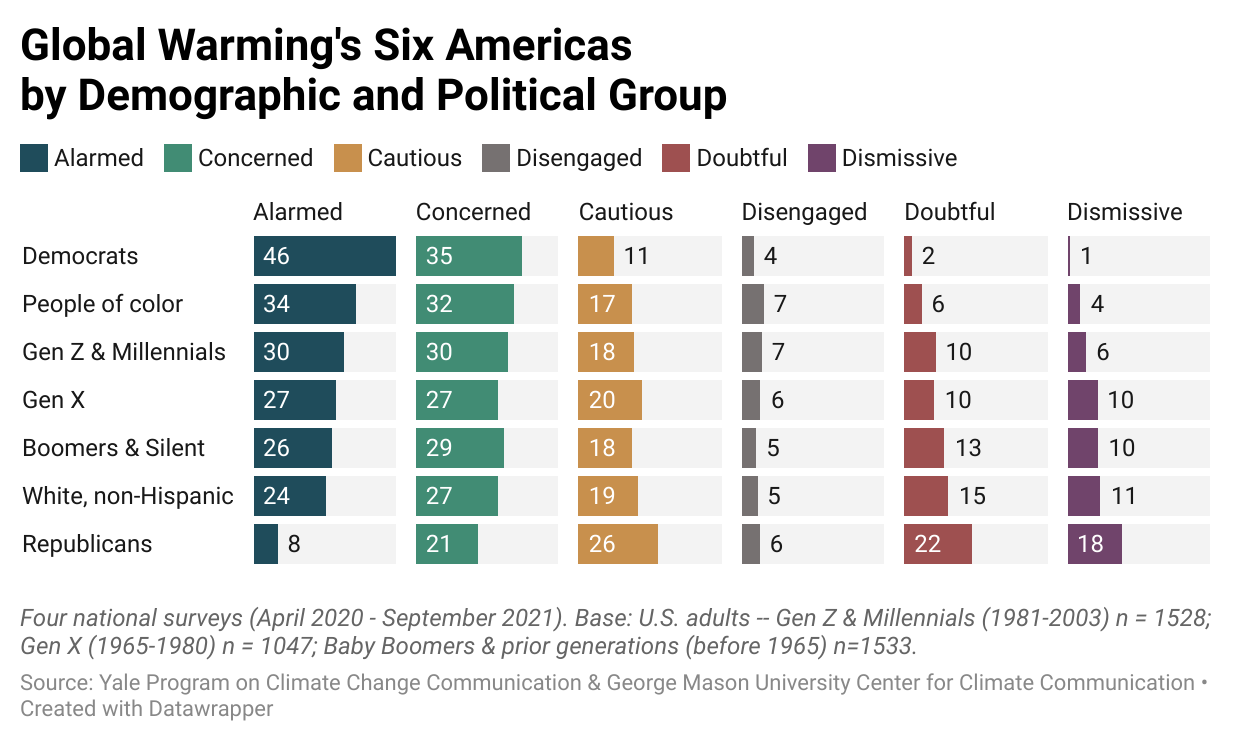Abstract:
It is often assumed that younger Americans are more engaged with the issue of climate change than older Americans. Nationally representative survey data conducted from April 2020 and September 2021, however, indicate that differences in partisanship and race are more pronounced than differences in age. A notable exception is younger Republicans. Younger Republicans, including Gen Z, Millennials, and Gen X, are more likely than Boomers and older Republicans to think that global warming is happening and caused by human activities, that there is a strong scientific consensus, and to support policies to address it.
Key Words:
Global warming, public opinion, climate policy
Youth have brought tremendous energy to the fight to reduce global carbon emissions, stabilize our climate system, and address environmental injustices. Individual activists such as Greta Thunberg, Vanessa Nakate, and Kelsey Juliana, along with organizations like the Sunrise Movement, School Strike for Climate, and Uplift have raised awareness, engaged millions around the world in political organizing, and advanced legislation to hold governments, corporations, and leaders accountable for damages from decades of inaction. A common narrative that has emerged in part from the success of youth activism is that older generations are resistant to change and less supportive than younger generations of strong climate action.
Survey research supports this idea—that age differences in climate views loom large and pose a significant barrier to climate action. The Pew Research Center (2021), for example, finds that 67% of Generation Z (born 1997–2012) versus 57% of Baby Boomers (1946–1964) and those older than them, think climate should be the top priority to ensure a sustainable planet for future generations. Likewise, 45% of Generation Z versus 21% of Boomers and older adults have engaged on social media with content on the need for climate action. Ballew et al. (2020) also found age gaps on climate views, noting that younger generations were more willing than older generations to engage in climate activism, such as volunteering and donating money.
We examine six questions from four nationally representative surveys, conducted from April 2020–September 2021 as part of the Climate Change in the American Mind project from the Yale Program on Climate Change Communication and the George Mason University Center for Climate Change Communication. The questions address:
- Whether global warming is happening.
- Whether it is caused by human activities.
- Understanding of the scientific consensus about human-caused global warming.
- Levels of worry.
- Support for a policy that requires fossil fuel companies to pay a carbon tax and uses the money to reduce other taxes (such as income tax) by an equal amount.
- Support for a policy that provides tax rebates for people who purchase energy-efficient vehicles (EVs) or solar panels.
For each question, we analyze three key audience stratification dimensions—political party identification, racial/ethnic group, and Global Warming’s Six Americas—each by age cohort. Global Warming’s Six Americas are audience groups identified on the basis of shared patterns in climate-related beliefs, risk perceptions, and policy preferences (Maibach et al., 2011; Chryst et al., 2018; Leiserowitz et al., 2021). Results for each survey are weighted to match demographic parameters in the United States, then the four surveys are averaged to account for differences in sample size.
Figure 1.

Overall, majorities across all age cohorts agree that global warming is happening, that it is mostly caused by human activities, and that most scientists agree on these points. Moreover, majorities across all generations are somewhat or very worried about global warming and support policies that require fossil fuel companies to pay a carbon tax and that provide tax rebates to people who purchase EVs or solar panels (see Figure 1, above). Differences in views by age cohort are statistically significant (p <0.05 or smaller) for each of the questions except for understanding of the scientific consensus and support for providing tax rebates for EVs and solar panels. Opinions differ most on the question of whether human activities are causing global warming; Boomers and older Americans are 12 percentage points less likely than Gen Z and Millennials to think that global warming is human caused.
Figure 2.

Differences between Democrats’ and Republicans’ views about climate change, however, are far more dramatic (see Figure 2, above). Majorities in both parties think that global warming is happening, but only majorities of Democrats think it is human-caused, think that most climate scientists agree, or feel somewhat or very worried about it. Partisans differ most—by roughly 50 percentage points—on levels of worry.
Partisanship has a much stronger influence on climate views than cohort does, but there are some distinct patterns in how different cohorts view the threat, particularly among Republicans. Younger Republicans, including Gen Z, Millennials, and Gen X, are more likely than Boomers and older Republicans to think that global warming is happening and caused by human activities, to believe that there is a scientific consensus, or to feel worried about it, and to support policies to address it. In particular, older Republicans are much less likely than younger generations to think that human activity is to blame (39% of Gen Z and Millennial Republicans versus 27% of Boomers and older Republicans). Cohort differences in climate views among Democrats are much smaller and vary in direction.
Unlike political partisanship and age, race and ethnicity not only play an important role in climate opinion, but also in the experience of climate change impacts. People of color are more likely to live in neighborhoods that were historically redlined (i.e., subjected to discriminatory lending practices), which even today result in land surface temperatures that are approximately 2.6 °C warmer than in non-redlined areas (Hoffman, Shandas, & Pendleton, 2020). People of color are thus already more likely than Whites to suffer from heat exposure that increases heat strokes, dehydration, loss of labor productivity, decreased learning, and deaths (Hsu et al., 2021).
Figure 3.

Differences in Americans’ climate views by race/ethnicity are smaller than those by political party. Even so, people of color were, on average, more likely than Whites to hold pro-climate views. People of color are more likely than Whites to think that global warming is happening (by 9 percentage points), that it is human caused (by 15 percentage points), and that there is a scientific consensus (by 4 percentage points; they are also more likely to feel worried about the problem (by 18 percentage points). In only two cases—the scientific consensus and tax rebates questions, and only for Gen Z and Millennials—are Whites as likely as people of color to hold a pro-climate belief.
Views of global warming among Whites and people of color also differ by generational cohort. The climate views of younger Whites and people of color are more closely aligned than they are for older Americans. For example, Gen Z and Millennial Whites are only four percentage points less likely than Gen Z and Millennial people of color to think that global warming is happening. Among Boomers and older, Whites are 15 percentage points less likely than people to color to think global warming is happening. Additionally, views among Whites tend to become less pro-climate among older cohorts, while the pattern is not as pronounced among people of color.
Figure 4.

Partisanship and demographic lenses provide important insights into the way different groups view climate change, but an attitude segmentation approach provides more nuance (see Figure 4, above). The segments represent a spectrum of views about climate change. The Alarmed think global warming is happening, human-caused, and an urgent threat, and strongly support policies to address the threat, reduce the impacts, and ensure public safety. The Concerned differ from the Alarmed insofar as they tend to believe that climate impacts are still distant in time and space, thus climate change remains a lower priority. The Cautious are unsure whether global warming is happening, human-caused, or serious, while the Disengaged know little about the issue and rarely or never hear about it. The Doubtful do not think temperatures are rising or else believe the changes are part of a natural cycle and not a serious risk. Finally, the Dismissive believe global warming is not happening, human-caused, or a threat, and most endorse conspiracy theories (e.g., “global warming is a hoax”).
Viewing our audience stratification dimensions of political party identification, racial/ethnic group, and age cohort by Global Warming’s Six Americas group sizes reveals large differences in the Alarmed segment sizes in particular. Almost half of Democrats (46%) are Alarmed, versus only 8% of Republicans. Variations in the other Six Americas groups are comparatively smaller. Gen Z and Millennials are slightly more likely to be Alarmed than older generations, but the differences pale in comparison to those of party and racial/ethnic groups.
Overall, majorities of all age cohorts in the United States are worried about global warming and support policies to reduce the risks. The largest differences in climate views are not across age cohorts but rather across party lines and between racial/ethnic groups. Moreover, there is no significant difference in the perception of environmental losses or support for future pro-environmental policy between generations (Gray et al., 2019). Nevertheless, differences in cohorts’ views within party and racial/ethnic groups reveal that such gaps appear to be shrinking for younger Americans. Younger Republicans are much more likely than older Republicans to think that global warming is happening and caused by human activities, to believe that there is a scientific consensus, or to feel worried about it. In addition, the climate views of younger Whites and people of color are more closely aligned than they are for older Americans.
‘Climate views of younger Whites and people of color are more closely aligned than they are for older Americans.’
Given the deep political polarization on the topic of global warming, observations of increasing alignment of younger generations’ climate views are a welcome finding. However, the long-term effects of today’s carbon emissions cannot wait for action from future generations alone. Older generations have unique strengths and power, such as understanding the importance of voting, being registered to vote, and turning out to vote at much higher rates than younger people. Leveraging this knowledge by educating youth about how to register to vote and then bringing a younger person along to vote with them is perhaps one of the most important actions that older people can take.
Older homeowners also are needed to support the development of solar and wind farms in their communities by promoting “Yes In My Backyard” (YIMBY) rather than “Not In My Backyard” (NIMBY) mindsets and advocating for these new clean energy sources. Because older generations are often more aware of community developments than younger people, lending their voices to advocate for clean energy and environmental policy in these contexts can have an outsized effect on helping the transition away from fossil fuels and toward clean energy.
Current scientific projections indicate that without significant action to reduce carbon pollution, average global temperatures may rise by more than 2°C in the next 80 years (Moore et al., 2022). The greatest uncertainty in climate projections no longer lies in assessments made by the scientific community, but rather in the hands of policy and decision-makers and the voters who elect them. Working together or separately, members of different generations bring different motivations and assets to the necessary task of creating political will for climate action.
Supplemental Information
Question wording from the surveys are as follows:
Global warming is happening
Recently, you may have noticed that global warming has been getting some attention in the news. Global warming refers to the idea that the world’s average temperature has been increasing over the past 150 years, may be increasing more in the future, and that the world’s climate may change as a result. What do you think:
"Do you think that global warming is happening?"
Response categories are “Yes”, “No”, “Don’t know.”
Global warming is caused mostly by human activities
“Assuming global warming is happening, do you think it is… ?”
Response categories are “Caused mostly by human activities”; “Caused mostly by natural changes in the environment”; “None of the above because global warming isn’t happening”; “Other”; “Don’t know.”
Most scientists think global warming is happening
"Which comes closest to your own view?"
Response categories are “Most scientists think global warming is happening”; “There is a lot of disagreement among scientists about whether or not global warming is happening”; “Most scientists think global warming is not happening”; “Don’t know enough to say.”
Worried about global warming
"How worried are you about global warming?"
Response categories are “Very worried”; “Somewhat worried”; “Not very worried”; “Not at all worried.” Percentages in the figures reflect the sum of “Very worried” and “Somewhat worried.”
Require fossil fuel companies to pay a carbon tax
"How much do you support or oppose the following policies?"
Require fossil fuel companies to pay a carbon tax and use the money to reduce other taxes (such as income tax) by an equal amount.
Response categories are “Strongly support”; “Somewhat support”; “Somewhat oppose”; “Strongly oppose.” Percentages in the figures reflect the sum of “Strongly support” and “Somewhat support.”
Provide tax rebates
Provide tax rebates for people who purchase energy-efficient vehicles or solar panels.
"How much do you support or oppose the following policies?"
Response categories are “Strongly support”; “Somewhat support”; “Somewhat oppose”; “Strongly oppose.” Percentages in the figures reflect the sum of “Strongly support” and “Somewhat support.”
Jennifer Marlon, PhD, is a research scientist at the Yale School of the Environment and the Yale Program on Climate Change Communication (YPCCC) in New Haven, Connecticut; Liz Neyens, MA, is an analyst, Benjamin Everett-Lane is a research assistant, and Seth A. Rosenthal, PhD, is a project director and research methodologist, all at the YPCCC. Edward Maibach, PhD, is a distinguished university professor and director of George Mason University’s Center for Climate Change Communication in Fairfax, Virginia. Anthony Leiserowitz, PhD, directs the YCCC and is a senior research scientist at the Yale School of the Environment.
References
Ballew, M. T., et al. (2020). Young adults, across party lines, are more willing to take climate action? New Haven, CT: Yale University and George Mason University.
Chryst, B., et al. (2018). Global warming’s “Six Americas Short Survey”: Audience Segmentation of Climate Change Views Using a Four Question Instrument. Environmental Communication 12(8): 1109–22.
Gray, S. G., et al. (2019). Will Millennials save the world? The effect of age and generational differences on environmental concern. Journal of Environmental Management 242: 394–402.
Hoffman, J. S., Shandas, V., & Pendleton, N. (2020). The Effects of Historical Housing Policies on Resident Exposure to Intra-Urban Heat: A Study of 108 US Urban Areas. Climate 8(1): 12. https://doi.org/10.3390/cli8010012
Hsu, A., et al. (2021). Disproportionate exposure to urban heat island intensity across major US cities. Nature Communications 12(2721). https://doi.org/10.1038/s41467-021-22799-5.
Leiserowitz, A., et al. (2021). Global Warming’s Six Americas: a review and recommendations for climate change communication. Current Opinion in Behavioral Sciences 42: 97–103.
Maibach, E. W., Leiserowitz, A., Roser-Renouf, C., & Mertz, C. K. (2011). Identifying Like-minded Audiences for Global Warming Public Engagement Campaigns: An Audience Segmentation Analysis and Tool Development. PLoS One. doi.org/10.1371/journal.pone.0017571
Moore, F. C., et al. (2022). Determinants of emissions pathways in the coupled climate—social system. Nature 603: 103–11.
Pew Research Center (2021). Gen Z, Millennials Stand Out for Climate Change Activism, Social Media Engagement With Issue. www.pewresearch.org/science/2021/05/26/gen-z-millennials-stand-out-for-climate-change-activism-social-media-engagement-with-issue/.









